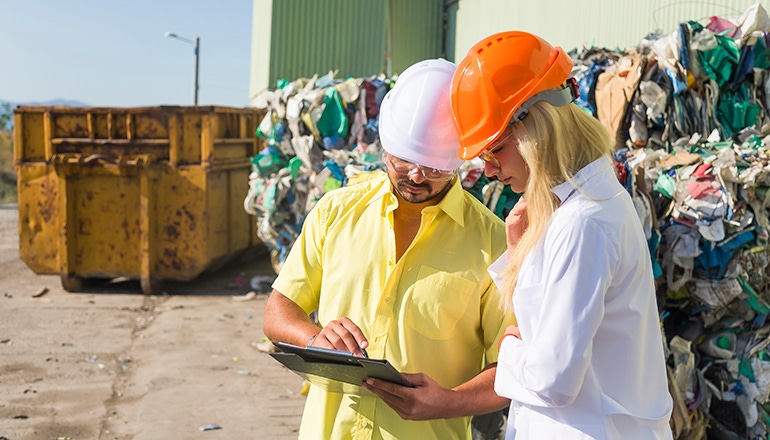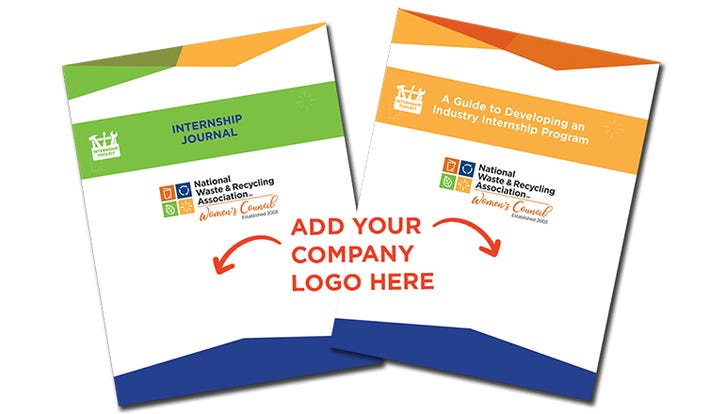The National Waste & Recycling Association and the Environmental Research & Education Foundation discuss internship opportunities and benefits.

Internships can be a great way for career seekers to become acquainted with an industry and for companies to attract potential short- and long-term employees. For the waste and recycling industry, internships can provide even more value because they can help individuals learn about all the different opportunities that the industry offers as well as the various ways the industry helps protect human health and the environment.
One of the industry’s leading foundations, the Environmental Research & Education Foundation (EREF), is working to attract more students to the industry via its internship program. Launched in 2017, EREF’s Internship in Excellence Program (IEP) came about in response to the industry labor shortage. The goal of the program is to bring in young talent, open their eyes to the importance and value of the industry and encourage them to pursue a career in solid waste after graduation, says Catherine Ardoin, communications manager at EREF.
“Gaining experience is crucial for every undergraduate prior to graduation,” states Ardoin. “Experience separates entry-level applicants from the rest of the pack. IEP interns receive real-world business experience, learning business etiquette and professionalism and honing their skills and knowledge. Given EREF’s rigorous standards, applying through the program sets students apart from other internship candidates because companies know that the candidates they receive are top-notch.”
As part of the IEP, interns are required to complete a number of EREF online courses as well as a written piece on either their experience or a technical topic. Once these materials are completed, interns are eligible for a scholarship up to $2,000.
The IEP has had five interns thus far, with another batch of interns coming into the program in the coming months. To date, interns have had the chance to learn from industry leaders at companies like Casella Waste Systems and Republic Services.
Samantha Steele and Leticia Nocko both interned at Republic Services. Steele got to participate in a ride-a-long during her internship, where she saw firsthand how collection works and how hard the members of this industry work.
“Being out on the road and having the opportunity to witness the waste industry through the ride-a-long was extremely beneficial,” comments Steele. “Although I was absolutely exhausted by the end of our ride-a-long, I had learned many aspects of the waste industry that I could not have gleaned from my desk in the office. I gained the utmost respect for the frontline workers who are extremely knowledgeable, skilled and dedicated, and I wish more people appreciated how vital their work is for everyone in the community.”
Nocko, who has experience working on research projects related to municipal solid waste landfills, expanded her knowledge of the complexities of the waste industry during her internship. She also learned how to simulate heat extraction from elevated temperature landfills using borehole heat exchangers, the differences in compliance between Arizona and California as well as the U.S. and Brazil, how Republic Services is structured and what different departments are responsible for, how waste is sorted and recycled, what challenges the industry is currently facing and more.
“For me, the internship with the waste industry was a very positive experience, and I strongly recommend it to those who are looking into working with solid waste,” says Nocko. “It taught me some of the main challenges of the industry, and it is helping me put my research into a better context and focus it on the industry’s needs. Because in the end, that same complexity that makes this field challenging is also what makes it fascinating.”
Jessica Babb and Oksana Bihun both completed internships at Casella Waste Systems. Babb worked as an environmental engineering intern in Casella’s Environmental Compliance Department, where she got to tour a landfill, a composting site and a recycling facility, expand her knowledge of the waste industry, update Casella’s facility list and more.
“Working at Casella was a great experience because I was able to get a preview of what it is like to work as an environmental engineer in an industry,” says Babb. “I also learned more about the waste industry and just how important it is to everyday life. I hope to continue learning about the waste industry, so I can contribute more in the future.”
Bihun worked at Casella as a sustainability intern, where she explored the intricacies of Casella’s departments, learned about the company’s safety and community engagement efforts, toured facilities to learn about their operations, learned about some of the pushback the industry receives from individuals who may not fully understand the industry and more.
“My experience working for Casella was so unique. I understand now why field experience outside of classroom learning is so important,” explains Bihun. “Seeing firsthand how landfills, materials recovery facilities and composting sites operated gave me a new perspective in seeing what actually happens to waste after it leaves our properties. I feel more grounded, as my work helped me understand the setbacks and restrictions that often befall sustainability efforts. I now recognize that there are limits to what we can ultimately accomplish for the environment. This is why we need to work with, not against, companies like Casella to reach a balance between environmental responsibility and societal needs.”
All of these individuals walked away from their internships with various insights, and as the IEP grows, EREF hopes that the program will inspire more talented individuals to pursue careers in waste and recycling. Offering a scholarship to eligible interns is a unique way that EREF aims to bring students into the industry.
“EREF also hopes that interns will take away a better understanding of what the waste industry does,” says Ardoin. “Previous interns have noted that prior to their participation in the IEP, they considered the waste industry to be the enemy in the fight for sustainability, but working in the industry gave them a new outlook. We want students to recognize the important work that the waste industry does and consider a job in solid waste after graduation.”
In an effort to help other companies in the industry develop and grow internship programs, the National Waste & Recycling Association (NWRA) Women’s Council recently released an Internship Toolkit. The toolkit consists of two components: “Internship Journal” and “A Guide to Developing an Industry Internship Program.”

“This free toolkit was developed to address industry workplace shortages, promote careers within the industry and help groom the next generation of industry professionals,” said Katie Raverty-Evans, NWRA Women’s Council professional development chair and a 2019 Waste360 40 Under 40 award recipient, in a statement. “We believe this toolkit will assist in attracting and retaining talented individuals new to the waste and recycling industry.”
The toolkit benefits both companies and interns. For companies, benefits include: attracting top talent and strengthening a company’s talent pipeline; marketing the company to its communities and customers; assessing talent for future roles within the company; creating brand awareness with local colleges and universities; providing management experience for employees tasked with intern oversight; gaining access to fresh perspectives; and developing mentorship opportunities.
For interns, benefits include: gaining marketable training, skill-building and job shadowing experience; exploring potential career paths; developing a broader professional network; learning many aspects of the waste and recycling industry; and receiving payment or academic credit.
“My first job out of college was through my internship and co-op, and I was with the company for five years,” says Raverty-Evans. “Although my internship wasn’t within the industry, a lot of the things I utilize today I learned from that internship, such as how to write emails, how to communicate, what expectations to discuss with your managers and so on. At the end of that internship, my boss gave me a book about the things they don’t teach you in college and the confidence I needed to launch my career.”
“Internships are just one of the pieces that help promote our industry,” adds Raverty-Evans. “We’re going through this ever-changing time where we’re fighting issues like climate change, and I think the more opportunities we give to young professionals, the more issues we’ll be able to solve.”
About the Author(s)
You May Also Like




